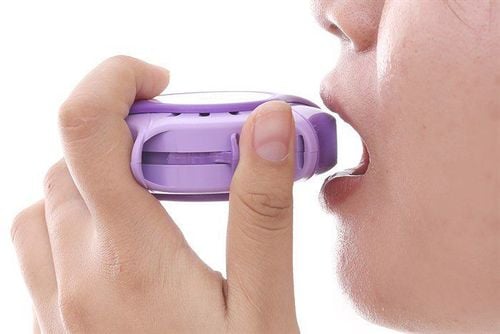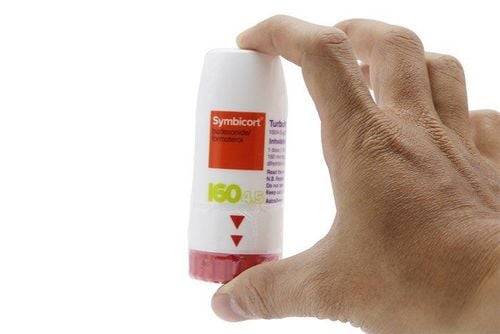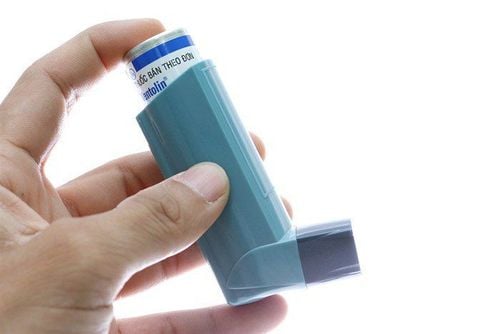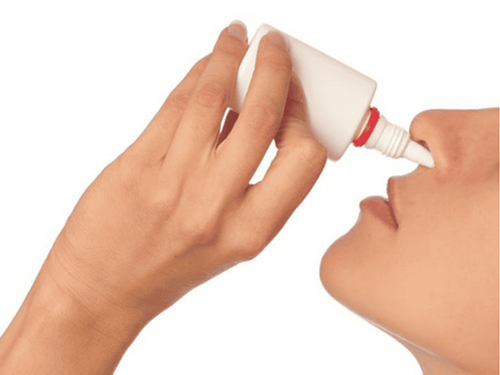This is an automatically translated article.
Prolonged allergic cough is a fairly common condition, especially for people living in hot, humid climates with a lot of rain. The treatment of cough caused by allergies requires the guidance and prescription of a doctor, the patient should not self-medicate.
1. What is an allergic cough? The cause to the illness
Allergic cough is a condition in which the throat mucosa is irritated by foreign factors and the body reacts. Some factors cause allergic cough such as:
Cough due to seasonal allergies: When the weather changes season, the sudden temperature change will make many people not able to adapt, so it will lead to the condition. allergic cough and sore throat. Allergies to mold and dirt: If you live and work in a dusty or humid environment for a long time, these bacteria may enter the body through the respiratory tract, thereby causing an allergic cough. accompanied by sneezing, stuffy nose, asthma , eye irritation. Inhaling Pollen: Pollen has a tiny texture so it can float in the air. When inhaled, pollen will stick to the lining of the nose leading to itching, from which the body will form a sneeze mechanism to push them out. When pollen gets through the throat, it can lead to an allergic cough, watery eyes, and sore throat. Allergies due to pet dander: Many people are sensitive to pet fur in the house, the reason is that they are easy to stick to objects, clothes... and when they inhale it, it will lead to allergic cough. . Allergic cough in children or adults is very common with common symptoms such as:
Itchy nose, sneezing, itchy throat and coughing in bursts that cause sore throat. It could be a dry cough or a cough with phlegm. When conducting the test, there was no increase in white blood cells; Before going to bed and after waking up with a cough; Monthly or yearly cough that does not go away with conventional anti-inflammatory drugs; Appears reflex pharynx - larynx causing difficulty in breathing or Quincke's pharynx - larynx.
2. How to treat allergic cough?
When diagnosing an allergic cough in an adult or child, usually doctors will use an H1 antihistamine to treat it. Based on pharmacokinetics as well as therapeutic effects, H1 antihistamines are classified into 2 generations as follows:
Generation I: Some first generation H1 antihistamines include: chlorpheniramine maleate, brompheniramine maleate, promethazine hydrochloride, diphenhydramine hydrochloride,... The drug has effects on both peripheral and central H1 receptors, strong sedative, anticholinergic and antiemetic effects. Generation II: Some second-generation H1 antihistamines such as loratadine, cetirizine hydrochloride and acrivastin... For the second generation, the drug has a long half-life, only acting on peripheral H1 but with little effect. on central H1, does not cause drowsiness. However, not everyone with an allergic cough can take an antihistamine. If the patient has prostate enlargement, myasthenia gravis, narrow-angle glaucoma as well as gastrointestinal and urinary tract obstruction, is taking MAOIs, is hypersensitive to the drug, or has skin lesions, it cannot be used. H1 antihistamines for the treatment of persistent allergic cough.
In addition to using H1 antihistamines to treat allergic cough, doctors will also use cough suppressants to help limit and minimize coughing for the patient. In case of allergic cough in adults and children with phlegm, the doctor will prescribe an expectorant to prevent throat discomfort and make breathing easier.
Note: The treatment of cough due to allergies requires the guidance and prescription of a doctor, the patient should not buy medicine to use on their own.

Ho dị ứng ở trẻ em hay người lớn đều rất thường gặp
3. How to prevent allergic cough?
To prevent allergic cough in children and adults, the following methods can be used:
Avoid or minimize exposure to pathogens; Regularly exercise, sports, drink enough water and regularly to strengthen health as well as the immune system; Wear a mask every time you go out, clean the house or have to go to places containing a lot of dust, mold, pollution... Follow a healthy diet rich in vitamin C. Do not eat foods that cause allergies. allergic reaction, rancidity, or allergies in the past... In short, an allergic cough is a very common symptom. Although not life-threatening, it will make the patient tired, chest tightness, headache, insomnia, affecting life as well as working and living. Therefore, in case a person has a long-lasting allergic cough that does not go away for a long time, it is necessary to go to a medical facility for examination and treatment. Currently, Vinmec International General Hospital is one of the leading prestigious hospitals in the country, trusted by a large number of patients for medical examination and treatment. Not only the physical system, modern equipment: 6 ultrasound rooms, 4 DR X-ray rooms (1 full-axis machine, 1 light machine, 1 general machine and 1 mammography machine) , 2 DR portable X-ray machines, 2 multi-row CT scanner rooms (1 128 rows and 1 16 arrays), 2 Magnetic resonance imaging rooms (1 3 Tesla and 1 1.5 Tesla), 1 room for 2 levels of interventional angiography and 1 room to measure bone mineral density.... Vinmec is also the place to gather a team of experienced doctors and nurses who will greatly assist in diagnosis and detection. early signs of abnormality in the patient's body. In particular, with a space designed according to 5-star hotel standards, Vinmec ensures to bring the patient the most comfort, friendliness and peace of mind.
Please dial HOTLINE for more information or register for an appointment HERE. Download MyVinmec app to make appointments faster and to manage your bookings easily.













